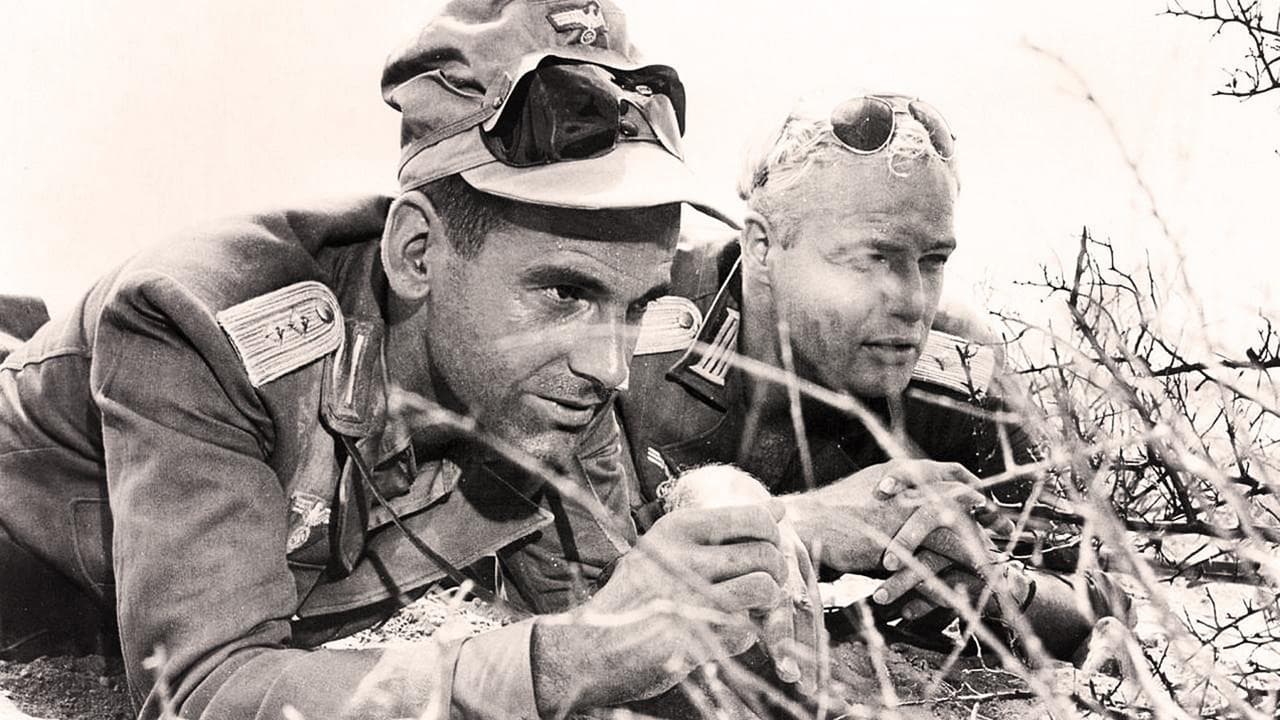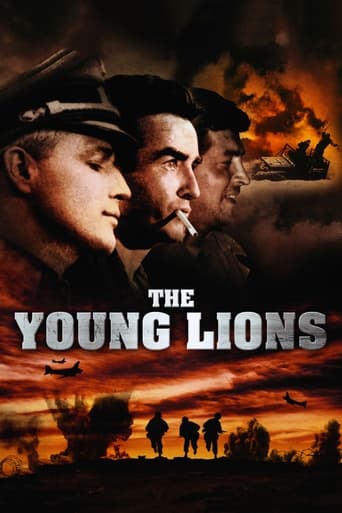

The performances transcend the film's tropes, grounding it in characters that feel more complete than this subgenre often produces.
... View MoreWhen a movie has you begging for it to end not even half way through it's pure crap. We've all seen this movie and this characters millions of times, nothing new in it. Don't waste your time.
... View MoreFanciful, disturbing, and wildly original, it announces the arrival of a fresh, bold voice in American cinema.
... View MoreAn old-fashioned movie made with new-fashioned finesse.
... View MoreFor a war film, perhaps the most compelling element of the picture has to do with the three protagonists remaining true to their personal codes of honor and integrity. That they were presented doing so with the backdrop of World War II was probably immaterial, though for Marlon Brando's character, the senselessness of war was repeatedly underscored by way of confrontations with his superiors and behavior on the battlefield. An anti-war sentiment resonates throughout but doesn't get in the way of patriotism. Perhaps to emphasize the futile nature of war on it's combatants, the picture occasionally meanders along disjointedly as well, scenes changing abruptly between the battlefields of Europe and North Africa with images and street scenes of New York and Brooklyn.You know, I often marvel at the way continuity in a movie is sometimes completely overlooked when the finished product is released. This one had a couple of examples that seemed glaring to me. When Noah (Montgomery Clift) meets Hope (Hope Lange) at Michael Whiteacre's (Dean Martin) party she's wearing a low cut evening gown, but when they step out for a walk along the river, she's wearing a dress with a collar. A similar scene occurs later on the first time Lt. Diestl (Marlon Brando) visits Gretchen Hardenberg (May Britt) at her Berlin apartment. Leaving her apartment for a prior engagement, Gretchen leaves wearing only her evening dress, but returns with a coat on. How is it no one caught those errors? Regarding the principal players, Marlon Brando stands out as the disaffected Nazi soldier, unable to reconcile his personal feelings about war with the mentality of the Nazi machine as personified by his commanding officer Hardenberg (Maximillian Schell). With no room for individualism, Diestl's loyalty to the Nazi cause erodes over the course of the War, and results in outright refusal to follow orders when he fails to shoot an opposing soldier upon Hardenberg's command. I thought more would come of that scene relative to his disobeying a commanding officer, so that left me a little puzzled.With Montgomery Clift's character, you had a Jewish retail clerk fighting bigotry both on the home front and among his fellow soldiers. The scene with Hope's father was done quite effectively to change the older man's feelings of prejudice, just as the overall tenor of the picture attempts to present every day Americans and Germans as people simply trying to make their way in life dissociated from the ideological extremes that make their countries war with each other.As for Dean Martin, this was the second movie I've seen him in within a short period of time in which he basically portrays himself; the other was 1960's "Ocean's Eleven". He comes across as a relatively happy-go-lucky kind of character, a singer and performer who likes to have a good time and with little regard for responsibility or authority. To his character's credit, he was a stand up guy for sticking by Noah against the barracks bullies who beat him to a pulp. One thing I hadn't seen before, Dino goes for a beefcake shot during the induction physical. I don't recall seeing him in anything similar in any other picture.The picture's finale offers contrasting scenarios - Brando's character comes to an untimely and inglorious end at the hands of Private Whiteacre, while the movie closes on Noah Ackerman's joyous return home to his wife and new baby. One wonders whether Mrs. Ackerman's name was written specifically for the intended effect of having a battle hardened soldier return to a new life filled with Hope.
... View MoreMarlon Brando's patrilineal ancestor, Johann Wilhelm Brandau, was a German immigrant to New York in the early 1700s. Marlon must have had the genes for his part in this rather soggy drama, as "Christian" --- would you believe! Actually, in real life, Brando was raised as a Christian Scientist. See Wikipedia. He did not play a Nazi in this film, in spite of what some reviewers say. They could not have been listening to the dialogue. Nor was he a member of the SS. He is supposed to have been a Bavarian cobbler, living in a mountainous ski-resort, who should have stuck to his last. Why does he then say: "Uh, I vish I vas back in Austria! I vish I was beck in ze snow... in ze vinter... in ze mountains..." ???? The truth is, in spite of what is misquoted on this site, he doesn't say "Austria". There is something faintly ludicrous in the motorcycle scene, with two Germans, Brando (Brando is NOT a Nazi --- another misdescription) and Schell, talking to each other in English with German accents. The language problem remains unsolved in many movies.There's something dissatisfying about this movie, but difficult to say exactly what. It's certainly overlong. It also seems just a wee bit too goody-good for its own good, and therefore lacks the bite that it might and ought to have had. Dean Martin is an unattractive character; Clift is just too shy, sweet, and weedy for words; Brando is very good, very charming, and makes one keep wishing the Germans had won. Some very silly reviewers wonder if his German accent would be considered plausible by Germans. How the devil would they be able to tell? I thought it was excellent --- better than his English accent, when he played the Fop on the Bounty.Worth a watch, but very dated. Will appeal more to Americans. Half-marks.
... View MoreI saw The Young Lions when I was 18 years old, the year it came out. I went into the theater a college kid from Texas who totally bought the swagger of American war heroes. I came out of the film absolutely devastated -- and decided I was now a pacifist and would dedicate my life as an artist to living up to the high standards of this film.All the acting is extraordinary -- Cliff is at his very best, Dean Martin is a surprising revelation playing a dissolute Broadway star he was perfect for. Maximilian Schell is amazing -- I don't know how he wasn't given an Academy Award for Best Supporting Actor. Barbara Rush, Hope Lange and May Britt are all indelible portraits of the three faces of 40's women.The cinematography is black and white at its best, sharp elements of chiaroscuro unmatched by color films. The musical score is on a level with Holst's The Planets, unrelenting and devastating.But the outstanding feature of the film is the incandescent performance by Marlon Brando at the peak of power as an actor. I don't think I had ever tried to imagine how the Third Reich came to be and how it might have affected a normal German citizen until Brando's brilliant work illuminated it for me. He is at his most handsome, obviously in great shape inside that tailored uniform, and truly epitomizes the "Golden God of War" who is enlightened by the horror he is expected to deliver, and is transformed into a tragic figure.This is as good as Saving Private Ryan or Schindler's List -- one of the most neglected masterpieces of American cinema: a Greek tragedy of our own era.
... View MoreThis film would be outstanding if only because it brought together three actors whose talent was unimpeachable -- Marlon Brando as the idealistic but ultimately disillusioned German lieutenant, Montgomery Clift as the wimpy but spunky Jewish GI, and Maximilian Schell as the ruthless, professional but not entirely unsympathetic German officer. Brando and Clift were both a bit past their prime, displaying mannerisms that would become habitual, and both were a bit old for their parts. Brando spends most of his time towards the end glowering. And Clift has the Make Up Department pin his ears outward, giving him and his already ruined face an outlandish prospect. But, man, can these boys act! Schell came into his own with superb performances in later, sometimes regrettable films like "Judgment at Nurenberg." But even in small roles, as in "The Freshman," he was a constant delight on the screen.The rest of the cast is up to professional standards. May Britt looks like some kind of Aryan predatory animal. (Yum.) Dean Martin established his acting career with this movie, after his split with Jerry Lewis. He could always be relied upon to play Dean Martin, though never memorably, his talents best suited to light comedy rather than dramatic parts. Here, he's a coward who, after a multitude of tergiversations, finally makes an existential decision prompted by Barbara Rush.There are, almost of necessity, romances involving the three principals -- Brando meets a French girl who despises Germans but comes to sympathize with his increasing despondency. I didn't find Francoise particularly appealing. She seemed to enjoy her exuberant attacks on Brando's character a little too much. And she's groomed a la gamin, petite, girlishly cruel voice, big black eyes with furry lashes, and short, curly black hair. Needs a good spanking if you ask me. Dean Martin does everything possible to avoid the Army and, after that fails, to avoid combat. Barbara Rush is his conscience as well as his main squeeze among what we take to be many.The love story involving Clift and Hope Lange is actually touching and even moving at times. It probably wouldn't be, except that Clift is SO homely, helpless, and needy, and Lange is SO bluntly candid and conventionally beautiful with her long blond hair and ski-slope nose. I felt deeply sympathetic for Clift's character when he accompanies Lange home to Brooklyn by means of a combination of bus, subway, and walking -- and then finds himself lost in the middle of the night. I had an almost identical experience, took her back to the hushed streets of Brooklyn after midnight. It was four hours before I reached my own home, less than 20 miles away in a Newark suburb. And if anyone had told me I'd be acting in two movies with Hope Lange years later, I'd have found it amusing.I wish there had been more combat scenes because the director, Dmytryk, handles them pretty well. I honestly don't think we need the dreary scenes at the concentration camp. They've become an unpleasant cliché. Even worse is when the German mayor of the nearby town objects to the Rabbi holding services for the now-liberated Jewish inmates and is thrown out by the Americans. It's insulting when writers treat the viewers like idiots.At that, though, I have to say the writers have made the characters a little more nuanced that they were in the novel, in which the Brando character was an unrepentant and cold-blooded stereotypical Nazi from beginning to end, as if Irwin Shaw were getting his revenge against the Aryans, right down to the character's name -- Christian.Finally, I don't know how anyone can watch Montgomery Clift in this film without noticing the similarities between his treatment by anti-Semites in basic training and the treatment of Clift's character in "From Here to Eternity."
... View More